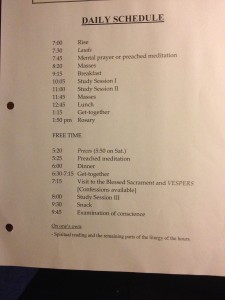Parish Novena to St. John Vianney
Our Novena is beginning, leading up to the feast of our holy patron, St. John Vianney. Let us seek his help and prayers, that the Lord would grant us our requests and our needs.
.
JULY 29: TRUE LOVE OF NEIGHBOR
Saint John Marie Baptist Vianney because of your love of God you showed great charity towards your neighbor. You could not preach on the Love of God without burning tears of love. During your last years, it seemed as though you could not talk about any thing else or live for anything else. Thus you sacrificed yourself to your neighbor by consoling, absolving and sanctifying them to the limits of your strength.
Your charity inspires me to greater love of God, a love which is shown more by acts then by words. Help me to love my neighbor generously as Christ loves them.
Holy Priest of Ars, I have confidence in your intercession. Pray for me during this novena especially for …
The Mustard seed
Friends in Christ,
today Our Lord speaks of the little mustard seed that becomes a great tree; and of yeast, which though barely seen, can transform the whole mass of dough. He is speaking of the big effects of a Christian life through seeming small actions.
.
In the year 404AD there lived a holy monk called Telemachus. He was a hermit of the desert, a man of prayer, but at one point he felt compelled to go to Rome. There, the gladiator games were continuing – the source of blood-lust and evil in which people reveled. The Catholic faith was by this time, legal, but it was evident that many were still pagan.
.
When Telemachus saw the horror of the gladiator games, men fighting each other and killing each other to the roar of the crowd – he was horrified. He jumped from his seat right into the arena, and stood between the gladiators. He was tossed aside, but he went back again, and then a sword appeared and he was dead.
.
But there was a hush. the enormous crowd was silent. A holy man was dead. something happened that day in Rome, for there were never any gladiator games any more.
.
Jesus speaks today of the tiny mustard seed and the yeast, which by themselves seem insignificant, but which can produce a great effect. This is how he wants our life to be. He wants us, by doing what is right daily, standing for the faith, choosing good over evil in a hundred little ways – like Telemachus – St. Telemachus – Our Lord wants us to be the catalyst for good in our own circles of influence. And we do this by daily prayer, and choosing the path of holiness at every step.
.
We don’t know where each step will lead us, but in this way, the Lord will be able to make great use of us to build up the kingdom of God.
St. James the Greater
Friends in Christ, today is the Feast of St. James the apostle, also called James the Greater. James and his brother John, the sons of Zebedee, were very ambitious. They wanted Christ to give them places of honor in his kingdom.
.
In this regard, Thomas Aquinas asks an interesting question: Is it a sin to be ambitious? (Summa 129-131) He begins by saying that it is fine to desire honors, if these honors are for having become virtuous, after all, it takes sacrifice to be virtuous. But, he says, a person should not focus so much on the honors he would receive, but rather on doing virtuous things. And it is more important that a person does great things for the glory of God, not so much for his own glory or fame.
.
Also, if another person receives honors for achieving great things, rather than envy, we should rejoice for them. A great person has no use for flattery, he works hard for God’s glory, and cares little for the praises of others. He associates with important people as well as the unimportant, the rich as well as the poor, without distinction.
.
St. Thomas says that it is wrong if a person seeks honors without referring them to God, and he is especially blameworthy if he seeks honors for achievements he has not really accomplished. Now St. James and his brother were blameworthy in seeking honors for that which they had not yet accomplished. Our Lord says that honors in the Christian life are good, but true honor comes through the cross, not in empty shows of importance.
.
St. James however, would earn true honor – he DID meet the cross, and gave his life as a martyr for Christ. In fact, he was the first apostle martyred – we read in Acts of the Apostles, chapter 12: ‘About that time King Herod laid hands on some who belonged to the church. And he had James the brother of John put to death with a sword.’
.
So then, let us be true Christians, and seek virtue, not so much for the honors or acclaim that they bring, but for the glory of God.
St. James is the patron saint of Spain, of pharmacists, knights, workers, soldiers, and veterinarians.
St. Mary Magdalene
Friends in Christ, today is the Feast of St. Mary Magdalene. Mary Magdalene has been called the 2nd most significant woman in the New Testament, 2nd only to the Blessed Mother. She was present at the two important events: Jesus’ crucifixion, and his resurrection. In the Holy Gospels she is named at least 12 times, more than most of the apostles. St. John and St. Mark mention Mary Magdalene as the first person to see Jesus after his resurrection, and she brought the news to the Apostles. For this reason St. Augustine calls her the ‘Apostle to the Apostles’.
.
For some periods in the Church, Mary Magdalene was one of the most popular saints, this is because she was a great sinner who had become a disciple and therefore a real hope for us.
.
For most of the history of the Faith, for important reasons, it was believed that Mary Magdalene was the sinful woman who came and anointed Jesus’ feet, whom he forgave. Today, among so-called intellectuals, it has become fashionable to claim that she was not that woman, that she was not a penitent prostitute, but I myself am not beholden to the latest fads, I prefer to trust the saints.
.
It has been said that St Mary Magdalene is one of the sweetest of the saints, because her love was so great. After her having washed Christ’s feet with her tears, and dried them with her hair, Jesus praised her love and said: ‘Much is forgiven her, because she loves so much.’ Mary Magdalene had in her heart, since the day Jesus forgave her – she had in her heart, gratitude.
.
She was from Magdala, a small fishing town on the Sea of Galilee, between Capernaum and Tiberias. Fr. Cliff Stevens says, ‘She was known to be a “great sinner,” a woman of the streets, who heard Jesus speak of the mercy and forgiveness of God, and changed her life completely.’ It was meeting God’s mercy, and thankful for a whole new, life, that explains Mary’s behavior at the tomb that Easter morn. Having thought Christ was the gardener, she asked what they have done with Jesus, and the Lord suddenly said to her: ‘Mary!’
‘O Raboni!, she said. And then she threw her arms around her Savior.
It was because she was full of gratitude.
.
She is the patron saint of pharmacists, converts, glove makers, hairdressers, penitent sinners, people ridiculed for their piety; perfume makers, and reformed prostitutes.
Summer Course for priests
It is time for my annual summer Course for Priests – the ‘tune-up’ that we all need, spiritually, intellectually, physically. It’s one of the benefits of belonging to the Priestly Society of the Holy Cross: they keep you ‘on track’!
Our Lady of Mt. Carmel
Friends in Christ, today is the Feast of Our Lady of Mt. Carmel. Mt. Carmel is located on the western edge of Galilee, overlooking the blue Mediterranean Sea. It is on Mt. Carmel, that Elijah beat the pagan prophets at their own game, and it was on top Mt. Carmel, that during the 12th Century during the Crusades, a group of brave and pious Knights came together. Fighting off the Muslim onslaught, they organized themselves into a religious order, being called the Carmelites.
.
As pressure from the enemy continued, the General of the Order at the time, Simon Stock, prayed fervently for assistance from the Blessed Virgin. Appearing to him on this day, in the year 1251, Mary designated the Brown Scapular as the special mark of her maternal love. That is why the present feast is also known as the feast of the Scapular. Mary made this promise: ‘Those who die wearing the scapular shall not suffer eternal fire.’
.
On another occasion, Our Lady appeared to Pope John XXII saying, ‘for those who wear the Scapular, I the Mother of Grace, will descend on the Saturday after their death, and whomsoever I shall find in Purgatory, I shall free, and lead them to the holy mountain of life everlasting.’ This additional promise, Mary’s bringing us to heaven the Saturday after our death, is called the Sabbatine Privilege.
.
If one wants to participate in this devotion, here is how it is done: You must commit to a life of chastity, according to your state in life. Single people will live in a pure way, and married people will keep their marital love wholesome, according to the laws of the Church. One also promises to have devotion to Mary, entrusting oneself to her; Devotion to Mary can be by many ways, perhaps best is praying the Rosary. Finally, you must be invested with the scapular, which any priest can do. This investiture must be done with a cloth scapular, but it can then be later substituted with a scapular medal if you like.
.
One should kiss the scapular each day and say, ‘Our Lady of Mt. Carmel, pray for us.’ You should never take it off except to shower. Pope John Paul II always wore the scapular. He once said that the Scapular is the sign of the protection of the Blessed Virgin in life’s journey, and also at death. Devotion to her, he said, cannot be limited to prayers on certain occasions, but must become a habit,’ a regular part of life.
.
St. Bonaventure
Friends in Christ, today is the Feast of St. Bonaventure. St. Bonaventure was born in 1221 in Bagnorea, Italy. When he was young he became very sick, and it is said that St. Francis cured him and gave him the name ‘Bonaventure.
.
At about 20 years old he became a Franciscan, and with his brilliant mind, he went on to teach theology at the University of Paris. Bonaventure worked tirelessly to reform and improve the Franciscan Order, in fact he is called the Second Founder of the Franciscans because of all he did. He also wrote the official biography of St. Francis.
.
At the University of Paris, the greatest center of learning of the time, two different and complimentary schools of theology were at work in those years. Thomas Aquinas was there, teaching a new approach to theology based on Aristotle. At the same time, at the same University, Bonaventure led another approach, a system which leaned heavily on St. Augustine. St. Bonaventure wrote a famous treatise called ‘The Journey of the Mind to God’ There, he calls us to find God in prayer.
.
‘To find God, he says, we must surrender ourselves to him. We must seek the Lord by grace, not by doctrine. By the longing of the heart, not in the mind; in the sighs of prayer, not in research. Seek the Bridegroom, not the teacher. Look for the raging fire that carries the soul to God, he says. The fire is God, and the furnace is Christ’s Passion.
.
St. Bonaventure was a mystic, and his approach to theology emphasized the heart more than the mind.
.
Historians sometimes try to pit Thomas Aquinas against Bonaventure as rivals, but in reality they were great friends who merely taught different ways of knowing God. They both received their doctorate in theology on the same day, and they both would die the same year, 1274. Thomas Aquinas is called the ‘Angelic Doctor,’ Bonaventure is called the Seraphic Doctor.’
.
St. Bonaventure was an intellectual giant, but he is a saint because of his holiness. When Pope Gregory decided to make him a Cardinal, he sent his ambassador to present Bonaventure with a red miter. When they arrived with the red hat of honor from the Pope, they found this simple Franciscan washing the dishes outside. He said to them, ‘My hands are wet just now, if you would kindly hang that hat on the tree over there.’
.
The symbol for St. Bonaventure is the Red Cardinal’s Hat.
Anointing of the Sick
Beloved in Christ, if you open up your bible to the Epistle of St. James, you will see that he says this: ‘Is any one among you sick? Then let him bring in the priests of the Church, and let them pray over him, anointing him with oil in the name of the Lord.’
.
This is really a description of the sacrament of Anointing of the Sick, and it was the practice of the first Christians.
We see also, in the gospel, that as Jesus was training his 12 apostles to be priests, he sent them out to pray for the sick and anoint them with oil. ‘And sending them out he gave them authority over unclean spirits, and they anointed with oil many who were sick.’
.
Anointing of the sick used to be called ‘Extreme Unction,’ which means the last anointing. This is because the first anointing is in baptism, the 2nd is at Confirmation, and the last anointing is Anointing of the Sick. Of course people sometimes receive this sacrament more than once. A person could have a serious illness, be anointed by the priest, then get better, and then another time be anointed, when sick again.
.
This holy sacrament is not for those who have a cold or a headache; it is not for people who have a broken arm. It is for someone who has a serious illness or is old or weak – anyone for whom there is at least some risk of death, even if remote. Of course if someone is dying, they should definitely receive this sacrament.
.
Anointing of the Sick was instituted by Christ, to give grace. Our Protestant friends do not have this sacrament, nor do they even believe in it, yet as we read, the Holy Bible teaches that when someone is sick the priest should be called to do this.
.
First let us see today, how Anointing is given. The two important parts of the sacrament are the Oil and the prayers. There are three oils used by the Church: Oil of Catechumen, for those who will be baptized, Sacred Chrism, which is used in Baptism, Confirmation, and Holy Orders; and Oil of the Sick. Our oils are kept in the little bronze receptacle at the side of the sanctuary.
.
When a person is sick, a family member should call the priest. If there is an immediate danger of death, one should call at any hour of day or night. If there is no immediate danger, one should not ‘put off’ calling the priest until the last minute of someone’s life! No way! For one thing, if you wait until the last minute, the priest might be gone away or busy saying Mass or at another emergency; it is also much better that the person is still conscious, so that he can confess his sins or at least hear the prayers of forgiveness. So we should never intentionally wait until the last minute of life to make that call.
.
If the sick person has not gone to confession recently, he should confess his sins first, and then he is anointed on the forehead and the hands. Now this sacrament is primarily for spiritual healing, which we will discuss. But it can cause physical healing. When I was a newly ordained priest, there was a call from the Emergency Room that a parishioner was near death. It was my first Anointing. I had hoped for an easier first one.
.
As I drove to the hospital, my mind raced; I wondered what I would encounter there. Walking into the emergency room, nurses were glad I came, and immediately took me to the room. There I saw the man surrounded by a frenzy of doctors and nurses and blood and syringes. To my surprise, the doctor stepped back and said, ‘Father, go for it.’ I went right over to the bed, absolved him, and with shaking hands, read the prayers, anointed him, and gave the Apostolic Blessing.
.
As the doctors went right back to work, I went home wondering and praying for the man. How did it turn out?
Well, for the next 5 years, that man sat in the front pew of Church on Sunday with his wife, and always said, ‘Father, I was your first one!’
.
I don’t know if the anointing saved his life, or if God’s grace guided the doctors, or both, but I do know that if this sacrament does not always bring physical healing, it always brings spiritual effects, and this is it’s primary action.
.
When a person has a serious illness of the body, it can lead to stress in the soul. For example, when someone is sick, they can become depressed, they can feel very alone, and they may have a fear of death. People are sometimes very able to bear the little crosses of life with patience, but when they become ill, it is not always so easy to keep one’s trust in God. Anointing of the Sick has the supernatural power to change the soul and drive away the anxiety of illness.
.
This sacrament drives away fear of death and judgment, and gives the person the strength to fight the devil, who often comes around when our life is in danger.
Our life is one that imitates Jesus. So when we are in pain, when we are on the cross with Christ, we need this special grace to help us bear it with joy and peace.
.
Many times, a sick person is fearful and worried; but no sooner are they anointed, than they are at peace sometimes even ready to offer their sufferings to God. This infusion of hope and the lifting of the burden of sickness, is a primary effect of this Holy Sacrament. The person is thereby united to the prayers of the Church, and by their sufferings, they too contribute to the saving work of the Church.
.
Under normal conditions, Confession takes away mortal sins, while Anointing of the Sick can take away venial sins. This is why we should make a good confession first. However, let’s say that the person has a sudden medical emergency, and becomes unconscious; then provided that the person is sorry for their sins, Anointing of the Sick for an unconscious person will take away even their mortal sins.
.
For those dying, Anointing of the Sick is a preparation for the new world ahead; it strengthens the soul against the final temptations of the devil, who wishes not to lose anyone to heaven. The body is anointed because it is through the 5 senses that any evil can come to us, and so in this way, the man is cleansed of the remains of sin.
.
Fr. Mersch says that by this sacrament, the person becomes conformed to the dying Christ, and is prepared for the passage to the invisible Church above.
.
When one is very sick, the family must not hesitate to summon the priest to bring this sacrament to their loved one. And a priest, even at the risk of his life, must administer the sacraments to his children who are in extreme need.
.
‘But my father hasn’t been to Mass for many years, he almost never prays.’ ALL THE MORE REASON to call the priest!
.
Older people will say, ‘Can you give the Last Rites’ to my mother? ‘Last Rites’ is a term not used much today. It refers to all of the final sacraments – whatever is possible. In the ideal situation, a dying person would receive 3 Sacraments: a good Confession, Anointing of the Sick, and then Jesus in Holy Communion for the final journey. This would be to receive all of the ‘Last rites.’ Obviously people are not always able to speak to make their Confession, or to swallow, to receive Communion; but if they have Faith, they can always receive the grace of Anointing of the Sick.
.
It goes without saying that the family should be praying with the sick or the dying person. These can be some made-up prayers from the heart, but be sure to also pray the Our Father and the Hail Mary with them, because it is an immense comfort to the dying, to hear the names of Jesus and Mary.
.
[Entrusted to the prayers of St. Pelagia]






